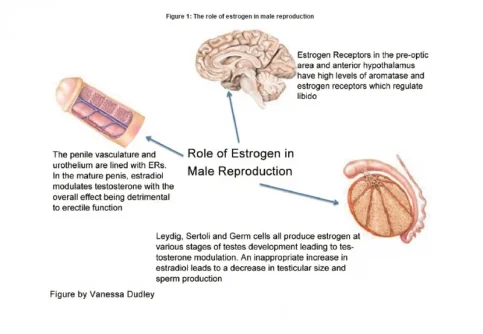CoastWatcher
Moderator
As part of prostate cancer (PCa) therapy, many men are deprived of all androgens. This "chemical castration" leads to profound hypogonadism and exceedingly low levels of estradiol. It also results in serious cognitive impairment. A recent study asked the question: can estradiol supplementation improve cognitive impairment in men on androgen deprivation therapy?

OBJECTIVE: To summarize data on the effects of estradiol treatment on cognitive function of androgen-deprived genetic male populations (PCa patients and male-to-female transsexuals) and castrated male animals.
RESULTS: While some studies showed that estradiol improves cognitive function (most notably, spatial ability) for castrated rats, what remains uninvestigated are: 1) whether estradiol can improve cognition after long-term androgen deprivation, 2) how estradiol affects memory retention, and 3) how early vs. delayed estradiol treatment after castration influences cognition. For androgen deprived genetic males, estradiol treatment may improve some cognitive functions (e.g., verbal and visual memory), but the findings are not consistent due to large variability in the study design between studies.
CONCLUSION: Future studies are required to determine the best estradiol treatment protocol to maximize cognitive benefits for androgen-deprived genetic males. Tests that assess comparable cognitive domains in human and rodents are needed. What particularly under-investigated is how the effects of estradiol on cognitive ability intersect with other parameters; sleep, depression and physical fatigue. Such studies have clinical implications to improve the quality of life for both PCa patients on ADT as well as for male-to-female transsexuals.
"Cognitive Impacts of Estrogen Treatment in Androgen-Deprived Males: What Needs to be Resolved," Current Neuropharmacology, 2018, https://www.ncbi.nlm.nih.gov/m/pubmed/28294068/

OBJECTIVE: To summarize data on the effects of estradiol treatment on cognitive function of androgen-deprived genetic male populations (PCa patients and male-to-female transsexuals) and castrated male animals.
RESULTS: While some studies showed that estradiol improves cognitive function (most notably, spatial ability) for castrated rats, what remains uninvestigated are: 1) whether estradiol can improve cognition after long-term androgen deprivation, 2) how estradiol affects memory retention, and 3) how early vs. delayed estradiol treatment after castration influences cognition. For androgen deprived genetic males, estradiol treatment may improve some cognitive functions (e.g., verbal and visual memory), but the findings are not consistent due to large variability in the study design between studies.
CONCLUSION: Future studies are required to determine the best estradiol treatment protocol to maximize cognitive benefits for androgen-deprived genetic males. Tests that assess comparable cognitive domains in human and rodents are needed. What particularly under-investigated is how the effects of estradiol on cognitive ability intersect with other parameters; sleep, depression and physical fatigue. Such studies have clinical implications to improve the quality of life for both PCa patients on ADT as well as for male-to-female transsexuals.
"Cognitive Impacts of Estrogen Treatment in Androgen-Deprived Males: What Needs to be Resolved," Current Neuropharmacology, 2018, https://www.ncbi.nlm.nih.gov/m/pubmed/28294068/















